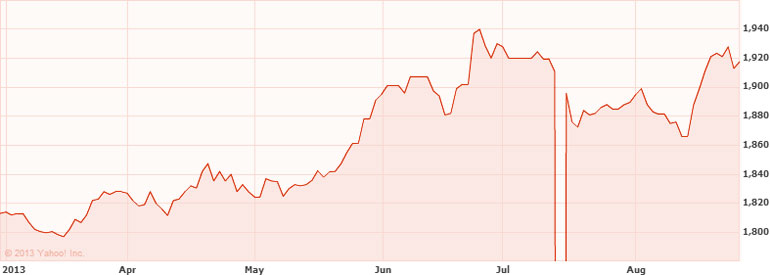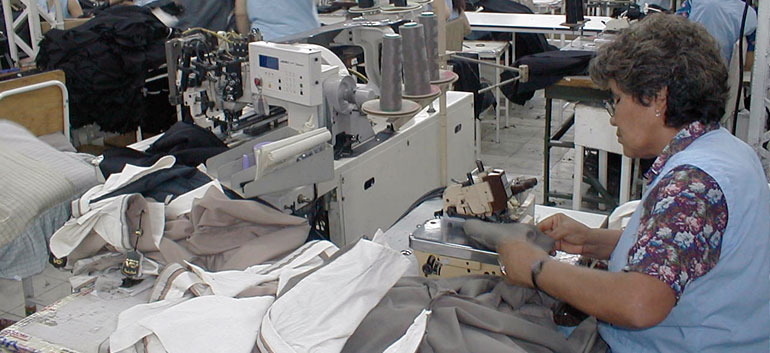As Colombia’s peso reaches the government’s target exchange rate against the dollar, the Andean country’s manufacturing contracted in output for the seventh time over an eight-month stretch.
According to the Colombian government’s economic reporting agency DANE, a 5.1% contraction hit Colombia’s manufacturing sector in June.
Fixing manufacturing is what Colombia’s Finance Minister Mauricio Cardenas has said is his priority, and so it is hardly surprising that Colombia’s macroeconomic policies are geared toward making the country cheaper and more competitive abroad.
A dollar-buying program and holding the reins on an overseas bond sale were two measures Cardenas took to tame what he called Colombia’s “mother of all problems”: the peso.
Colombian peso against US dollar over past 6 months

Now that Colombia’s currency has weakened to between 1,900 and 1,950 pesos to the dollar, the range Cardenas has called his ‘ideal’ target, some, like Foreign Exchange Analyst Alexander Fletcher of Ultrabursatiles, believe Colombia’s industrials could bounce back by the end of the year.
But Julian Trujillo, a manufacturer who exports abroad, insists the industry is still far from recovering from a drop in output that coincided with the implementation of a free trade pact with the United States.
Trujillo is the Vice President of Trade at Fiber Glass, an arm of Paris-based multinational Saint-Gobain Group, which makes fiberglass products like insulation outside of Bogota. According to Trujillo, 40-50% of Fiber Glass’ products are exported abroad to 20 countries, including Europe and the US.
“It’s going to take a while for this industry to turn around,” Trujillo told Colombia Reports. “We’re looking at another three years of problems.”
Change in industrial output by month on year
Trujillo says that Fiber Glass suffers from Colombia’s high costs of transportation and logistics, rendering its goods far less competitive than other countries. As a result of infrastructure underdevelopment, the manufacturing industry is producing at 40-50% of its potential, says Trujillo.
“Companies,” he laments, “have lost their competitiveness.”
MORE: Business confidence falls in July
Alexander Riveros, Senior Economist at Bancolombia, agrees. Riveros told Colombia Reports that the peso is just one of Colombia’s problems when it comes to the industrial sector. The other one is competitiveness.
“Colombia isn’t as competitive as other countries in terms of costs – like the costs of transportation, logistics, and gasoline,” said Riveros.
Competitiveness, more so than the peso, is what Trujillo and Riveros both think needs to change, and according to Riveros, the current government’s economic policies are directed toward improving competitiveness.
“What’s going to happen in the future is that Colombia is going to advance in productivity,” said Riveros.
“All the government’s policies are directed toward improving productivity: infrastructure, transportation, logistics… and these sorts of things aim toward a reduction of real costs, not nominal costs… in other words, what we sell abroad will be cheaper, independent of any currency factors.”
Yet, have Colombia’s economic policies been successful at preparing manufacturers like Fiber Glass?
“Not yet,” says Trujillo. “For 8 years, the previous government didn’t advance at the rhythm of infrastructure development that it should have. The past government didn’t do anything.”
Colombia’s current administration, led by President Juan Manuel Santos has led reforms to push down taxes for companies. Riveros says that other reforms, like a law that will ease the tax burden on companies’ labor costs, have not come into effect yet.
Santos has plans for infrastructure too. Colombia’s Ruta del Sol aims to connect the country via multi-lane highways. Right now, major transit routes are clogged with slow-moving trucks and as a result, the price of moving goods from the interior to Colombia’s ports comes with painfully high costs.
Total industrial production output by month 2011-2013
Those are the costs manufacturers like Trujillo’s company have to suffer, but the Santos government’s moves to make the country more competitive are only one piece of Colombia’s economic policy puzzle. Free trade agreements are the other one. Colombia now has pacts with the U.S., Europe, South Korea, and an alliance with three other Latin American states that share the Pacific: Mexico, Peru and Chile.
“When the US signed the free trade agreement with us,” explains Riveros, “it was during a hard time… low growth, low domestic consumption in the US. People say that the FTA with the US has produced poor results… but they don’t consider that that was when the US was in a phase of low growth.”
Riveros believes “when trade with the US recovers, it will be much more favorable for Colombia. And if Colombia manages to get ahead in industrial productivity, the manufacturing sector could see benefits of the trade agreements.”
But Trujillo sees the Free Trade Agreements not as friend, but foe.
“We weren’t prepared for the Free Trade Agreements. No, no, no,” explains Trujillo. “It did help us bring down costs of raw materials, and that helped boost our competitiveness a bit…. but there are a lot of industries, like ours, that aren’t prepared.”
MORE: Experts already worried over FTA with Europe
Trujillo says the adverse effects of the Free Trade Agreements go beyond his own company’s plight. The flood of cheap goods coming into Colombia is pushing out local manufacturers, and, he says, it is causing regulatory problems.
“Shoes, super cheap, without any standards [are coming into our country],” says Trujillo. “Electric insulation that doesn’t meet standards… The worrying thing is that now these products of very low quality are coming into the country, taking advantage of the FTAs, and they aren’t obeying regulations.”
Sources
- Interview with Alexander Riveros (Senior Economist Bancolombia)
- Interview with VP of Trade Julian Trujillo (Fiber Glass, Saint-Gobain Group)
- Product & Manufacturing details (Fiber Glass Colombia)
- Manufacturing output data by month (DANE)
- Export data by country (DANE)
- Export data by sector (DANE)


